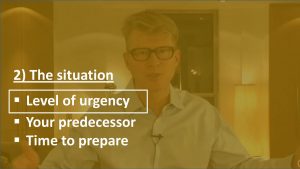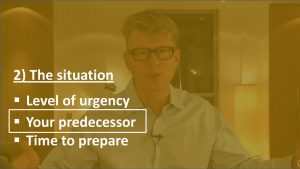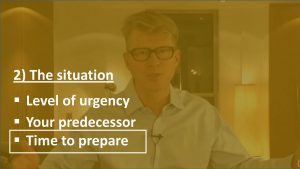As HR leader, I get very often the question how to best manage the first 100 days in a new job. This article outlines what to consider when you will shape YOUR first 100 days in order to make that start in the new role as efficient as possible.
If you dive into the literature on this topic of the first 100 days in a new position, you will discover that there are quite different schools of thought on this topic.
1. The action-oriented school
One school of thought is saying that any action that has not been taken during this first time period will become much more difficult to take at a later stage. The idea is that any bold decisions should ideally be announced at the very beginning.
This is based on the assumption that during this first phase in the new job, you will be perceived to be more neutral than those who have been in the organization since longer and that this gives you a higher legitimacy to trigger change. With other words, the fact that you are free from influences gives you permission to act and it would therefore be a missed opportunity if you did not use those first 100 days to take quick and bold decisions.

Authors, consultants or coaches who share this perspective would usually recommend starting to collect as much information as possible about the new job and the new organization even before starting, in order to be best prepare to make important decisions during these first 100 days.
Does that make sense? Yes, it does and you would be tempted to follow this approach immediately, if there was not another perspective that you can come across and which is interestingly going exactly in the opposite direction!
2. The listening-oriented school
According to this other school of thought, it is advisable not to take any action, but instead, to be in the listening mode. The recommendation is to interact with as many people form the organization as possible, to let people share their perspectives and to hold your judgement back. The advice that those who defend this perspective would give, is to stay as open as possible; to avoid rushing into any premature conclusions; to consider as many points of view as possible; to stress test your beliefs and to be in a learning mode.
Some would go as far as recommending that – if possible – your predecessor should still keep the operational responsibility, so that you can be as free as possible to observe, to understand the culture of your new environment, to make up your mind on the strength and weaknesses of that new organization and to assess the teams.

The assumption here is that any information that you have not taken in from the people in the organization during these first 100 days will be much harder to collect later, because people will find it more difficult to share certain pieces of information with you. Staying low key and being in this non-threatening mode creates a privileged space to access information. This is also based on the experience that once you have taken full responsibility, you are caught up in the fire of day to day management and making time available will be difficult.
3. Who is right, the action or the Learning oriented school?
Isn’t that amazing, how these two perspectives are directly opposite one to the other, but both make sense? Who is right, the action oriented school or the listening oriented school? As so often, it depends. I believe it depends on YOU and on the specific situation that you will move into, when you take the new responsibility. Let’s take a look at these two aspects.

3.1 It depends on you!
First of all, it depends on you, because the choice of the approach is related to your personality. I believe that it is actually very useful to understand that these two approaches exist, so that you can make a conscious decision of how you want to shape these first 100 days.
Make them YOUR first 100 days! As a matter of fact, the very first decision that you will make in the new job is to choose what approach to take and this will send a strong signal to the organization about who you are. As you know, there is never a second chance to make a good first impression. This first signal can be very impactful, especially if you actively communicate about the approach that you have chosen to your new entourage.
That will be a first landmark of your leadership style. You may decide to tell everyone what your roadmap for the first 100 days is, or maybe only to those, who will be close to you? Up to you to make that call, based on your personal preference and of your assessment of the situation.

The experience you may have been able to make in the past of taking a new responsibility (either in your current or in a new company), will certainly play a role in your decision as well. This experience might help you assess the time you will need to familiarize yourself with the new environment, before being fully operational in that new role.
Finally, it is important to point out how important it is for any leader to build a strong team or to be accepted by the existing team, if it is already in place. Developing a relationship of trust within the leadership team is certainly a key success factors when moving into a new role and should be one of your first priorities. The speed by which you will be able to leverage on your leadership team to make strategic decisions and have full support of that group, will contribute significantly to your successful onboarding.
3.2 It also depends on the situation
The choice about how to approach your first 100 days will also depend on the situation of the organization you join.
a) A crisis may require to shortening the time for listening

If you are confronted to a crisis, which you have been recruited to fix, it is very likely that you will not have the possibility to listen for 100 days, because it will actually be expected that you move much faster into trouble shooting. The only option that may have in that case, is to still preserve a certain time for the listening mode, which could be for example of only 50 days or less.
Even just 3 week of listening mode can make a big difference and give you deeper insights that you might not be able to gain so easily, once you are fully engaged in the operational management.
b) The question of your predecessor

The other factor is the question, if your predecessor is still available for the handover period. It is a very privileged way to move into a new organization, if you can have an agreement that your predecessor keeps the operational responsibility for the business during a transition period.
This allows you to be more in the observation position outlined above. This is not always possible, because your predecessor might have moved on already. Also, the context of the change of incumbent has to be taken into consideration. But where possible, taking advantage of such a transition can be very advisable.
c) The time to prepare

Last but not least, it depends also on the time you had to prepare. The more time you had before the start of the 100 days to collect information about the new positon, the more likely it is that you can move efficiently into the action mode quickly.
4. Conclusion
So we see that there are many factors to consider. But the point I would like to make is that this decision about the way you want to manage your first 100 days should not be taken lightly. Think about your preference, think about the situation and make a conscious decision. Make sure that you communicate about that decision to the organization and to your teams, because that will already be a strong first signal that you will give them about yourself.
I hope this helps and I wish you a great start when you will be moving into a new position!
More information in my book:
Sven Sommerlatte : Successful Career Strategy – An HR Practitioner’s Guide to Reach Your Dream Job (Springer, June 2023). ISBN: 978-3-662-66790-3
